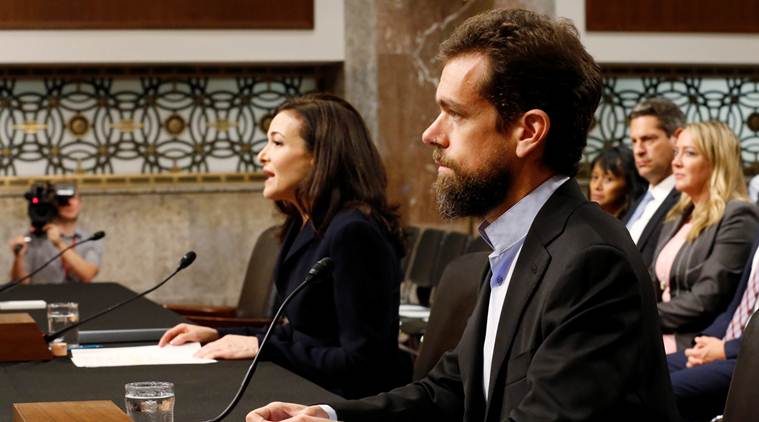Facebook, Twitter on defense in US Congress over foreign bids to tilt politics
Facebook Chief Operating Officer Sheryl Sandberg, who testified alongside Twitter Chief Executive Jack Dorsey, acknowledged to the Senate Intelligence Committee that the company was too slow to respond to Russian efforts to interfere in the 2016 US election.

Twitter CEO Jack Dorsey and Facebook COO Sheryl Sandberg testify before a Senate Intelligence Committee hearing on foreign influence operations on social media platforms on Capitol Hill in Washington, US, September 5, 2018. (Source: REUTERS)
Top executives from Facebook Inc and Twitter Inc defended their companies in the US Congress on Wednesday over what lawmakers see as a failure to combat continuing foreign efforts to influence US politics. Facebook Chief Operating Officer Sheryl Sandberg, who testified alongside Twitter Chief Executive Jack Dorsey, acknowledged to the Senate Intelligence Committee that the company was too slow to respond to Russian efforts to interfere in the 2016 US election and general American political discourse, but insisted it is doing better.
“We’ve removed hundreds of pages and accounts involved in coordinated inauthentic behavior – meaning they misled others about who they were and what they were doing,” Sandberg said.
2m 33s

Chaos grips Senate hearing on Trump Supreme Court pick Kavanaugh
Chaos engulfed the U.S. Senate confirmation hearing for Brett Kavanaugh, President Donald Trump's Supreme Court pick, as Democrats on Tuesday complained bitterly about Republicans withholding documents about the nominee's past White House service and shouting protesters were arrested in droves. Jonah Green has more.
“When bad actors try to use our site, we will block them,” she said.
Dorsey also described Twitter’s tighter monitoring of malicious use of its platform, including notifying law enforcement last month of accounts that appeared to be located in Iran. He said it suspended 770 account for violating Twitter policies.
Facebook, Twitter and other technology firms have been on the defensive for many months over political influence activity on their sites as well as concerns over user privacy.
“Unfortunately, what I described as a ‘national security vulnerability,’ and ‘unacceptable risk,’ back in November remains unaddressed,” Senator Richard Burr, the committee’s Republican chairman, said.
“Clearly, this problem is not going away. I’m not even sure it’s trending in the right direction,” he added.
Before the hearing, US President Donald Trump, without appearing to offer any evidence, accused the companies themselves of interfering in the US mid-term elections in November, telling the Daily Caller that social media firms are “super liberal.”
Trump told the conservative news outlet in an interview conducted on Tuesday that “I think they already have” interfered in the Nov. 6 election. The report gave no other details.
As the hearing began, social media stocks fell, with Twitter down 4.5 percent and Facebook around 1 percent lower.
Executives from the companies, which have repeatedly denied political bias, have traveled to Washington several times to testify in Congress, including 10 hours of questioning of Facebook Chief Executive Mark Zuckerberg over two days in April.
The Senate Intelligence Committee has been looking into Russian efforts to influence US public opinion throughout Trump’s presidency, after US intelligence agencies concluded that entities backed by the Kremlin had sought to boost his chances of winning the White House in 2016.
REPUBLICANS CHARGE BIAS
Moscow denies involvement, and Trump – backed by some of his fellow Republicans in Congress – has repeatedly dismissed investigations of the issue as a partisan witch hunt or hoax.
Some Republicans have also charged social media companies with bias against Trump and other conservatives.
Conspiracy theorist Alex Jones held a press conference outside the Senate hearing room as the testimony began to criticize the social media companies for banning him and his website Infowars from their platforms.
Twitter’s Dorsey was to follow his Senate testimony with an appearance at an afternoon hearing looking at that issue in the House of Representatives.
Dorsey will tell the House Energy and Commerce Committee that Twitter “does not use political ideology to make any decisions,” according to written testimony made public on Tuesday.
Trump faulted Twitter on July 26, without citing any evidence, for limiting the visibility of prominent Republicans through a practice known as shadow banning.
Last week Trump accused Google’s search engine of promoting negative news articles and hiding “fair media” coverage of him, vowing to address the situation without providing evidence or giving details of action he might take.
Republicans control majorities in both the Senate and House, but the House’s approach to the election issue has been far more partisan than in the Senate.
In the Senate, both Burr and the committee’s Democratic vice chairman, Senator Mark Warner, said they called Wednesday’s hearing to press the social media companies to do more.
They also asked Alphabet Inc’s Google to send a top executive to testify, but declined its offer to dispatch Chief Legal Officer Kent Walker rather than Alphabet Chief Executive Larry Page.
Google did release written “testimony” from Walker ahead of the hearing, even though he was not expected to appear. Walker said in his statement that the company was taking the issue of foreign interference in politics very seriously.
A committee spokesperson said Walker’s “commentary” was not testimony, adding, “We wish his enthusiasm for participating in the company’s public hearing extended to his company’s senior leadership, and that they were willing to answer the committee’s questions.”















.png)



























No hay comentarios:
Publicar un comentario